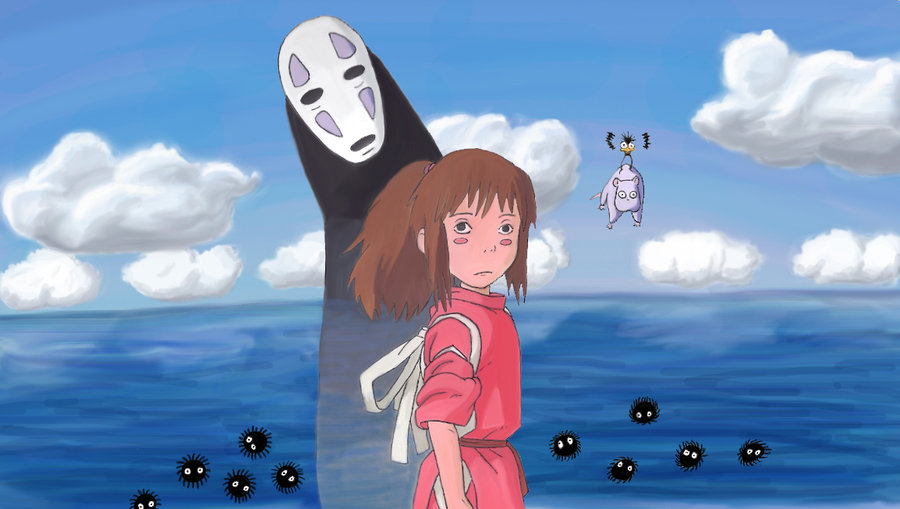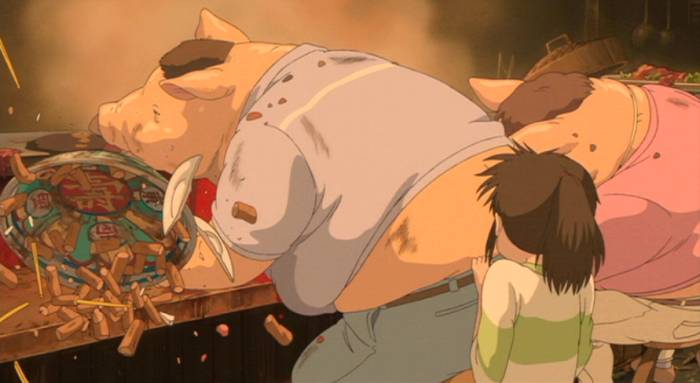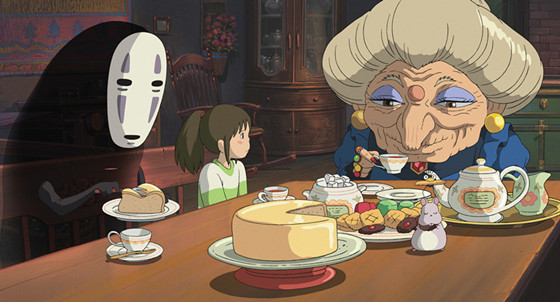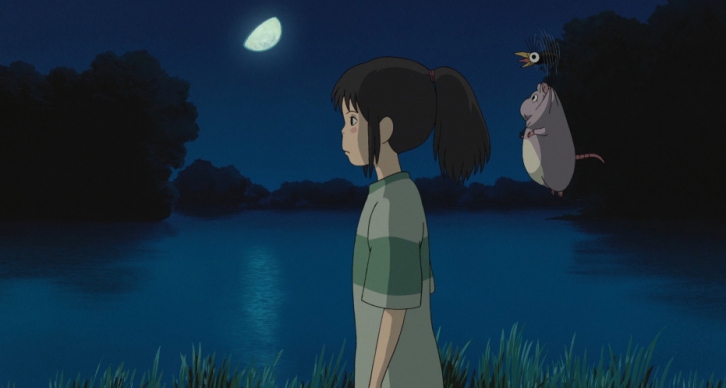
“Miyazaki has been crafting films more lusciously illustrated and rapturously imaginative than almost anything else on the silver screen.”
– Richard Corliss, TIME Magazine
Come sail away
Most assuredly there is no one else making animated films like auteur-director Hayao Miyazaki. Born in Tokyo in 1941, the personal universe he presents onscreen is absolutely unparalleled, a manufacturer of one of a kind miracles, consummate cosmologies, and as such, his delicately captured and elegantly rendered artisanal fantasies are surreal singularities, loved and cherished in the hearts of so many.
Japan’s highest grossing movie of all time, Spirited Away earned 30.4 billion yen, and was the work that got Miyazaki identified as one of Nippon’s greatest living writer-directors, and rightly so.
With its ample and teeming animation styles, not to mention its vicious-streaks, and often scatological connotations, Spirited Away denounces Disney’s silky-edged hegemony with speed. Offering recurring leitmotifs, Studio Ghibli presents vibrant fantasy realms populated with young, analytical, forward-looking, female protagonists and––above all––the suspicion that what is being shown is a dreamlike estimation of unconscious anxieties prompted by being in the real world.
“It’s not me who makes the film. The film makes itself and I have no choice but to follow.”
– Hayao Miyazaki
Over the hills and far away

Dissident to so many mainstream animated films, Miyazaki constructs imaginative worlds without the condescending expression and over-sentimental characters. This certainly allows for the appeal his features have to both adults and children, elaborate enough for the former to appreciate yet simple enough for the latter to enjoy on an altogether express level.
Like so many of Miyazaki’s films, like My Neighbor Totoro (1988) or Ponyo (2007), Spirited Away rewardingly contrasts the differing and digressing behaviors of adults and children, which also adds to the prescription for what’s essentially universal appeal.
“Miyazaki is one of the greatest filmmakers of our time. At Pixar, when we have a problem and we can’t seem to solve it, we often take one of Mr. Miyazaki’s films and look at a scene in our screening room for a shot of inspiration. And it always works! We come away amazed and inspired. Toy Story owes a huge debt of gratitude to the films of Mr. Miyazaki.”
– John Lasseter (director of Toy Story)
Childhood’s end

Spirited Away tells the adventurous tale of 10-year-old Chihiro Ogino (voiced by Rumi Hiiragi in the original Japanese and Daveigh Chase in the Disney dub) and her parents (Takashi Naitô, Yasuko Sawaguchi and Michael Chiklis, Lauren Holly) on their way to their new home when they take a strange detour and stumble through a remarkable and significantly figurative tunnel.
Once through the burrow, the shy and somewhat shaky Chihiro and her headstrong parents find themselves in an ostensibly abandoned theme park where things aren’t at all what they seem.
Foolishly satiating themselves on an unattended buffet of delicious and exotic food, Chihiro’s parents gravely and wondrously transform into a pair of giant pigs. As night descends on the funfair, actually more like a novelty town of objet d’art, the place becomes populated by spirits––supernatural beings––who need respite in the earthly sphere.
Chihiro must find a way to move amongst the entities, overcome her bête noire so she can rescue her parents, and figure out a way home. Befriended by a benign spirit named Haku (Miyu Irino and James Marsden), Chihiro toads her way deep within the town, where eventually she comes across a witch by the name of Yubaba (Mari Natsuki and Suzanne Pleshette).
Yubaba (who’s honeydew melon of a head seems modelled perhaps on the Duchess in Sir John Tenniel’s Alice illustrations) runs a successful, strange, and very embellished spa resort, a bathhouse, that seems to be the crux of the place, attracting a large clientele of eccentric, erratic, and occasionally hostile spirits.
It’s through this bathhouse, as Chihiro reinvents herself and mingles amongst the inexplicable and inconstant entities and accomplices that she can break free, or at least hope to. And though much in this film is unfamiliar, it’s rather recognizable heroic mythology that the heroine Chihiro has to pass various tests and troublesome trials to secure her return to normality and sanctuary.
“[Spirited Away] is the product of a fierce and fearless imagination whose creations are unlike any you’ve seen before.”
– Kenneth Turan, Los Angeles Times
Seeing is believing

Taking after literary fabulists from Europe, Spirited Away is Miyazaki’s variation of Lewis Carrol’s Alice in Wonderland, with a dash of A.A. Milne. The hand-drawn scenes radiate with affection, energy, and wild invention.
Japanese architecture and design collide with East Asian bailiwick––the bustling streets and busy bathhouse were inspired by downtown Jiufen in Taiwan––making a pasticcio of character and temper. Miyazaki, with Spirited Away, shares the cultural disparity of his great countrymen, directors who rose to international prominence like Kenji Mizoguchi (1898–1956) and Yasujirō Ozu (1903–63).
Also, and this of course is emblematic of Miyazaki’s body of work, he spins a fantastical yarn rife with sui generis spirits and solitary creatures who follow their own strange rules, governed by their own impermeable logic. Miyazaki’s lush world-building includes amphibious trains, baroque-gothic labyrinths, doppelgängers, dragons, and destructive spirits who pay in gold.
As Miyazaki’s tale deepens a dream logic dictates that some characters will change shape and even personalities without a wink. It’s no wonder that Chihiro reacts to each creature she encounters first with disorienting agitation, then with something akin to fear, and in consummation, with great courage.
It’s with mordancy that Chihiro is, to borrow a phrase made popular by Robert A. Heinlein, a stranger in a strange land, and yet the spirits and other odd inhabitants who dwell here consider Chihiro the strangest of all.
“You don’t remember your name?”
– Chihiro
You’ve got to see my bottle full of charms

The ruminative and mysterious dragon-boy half-caste Haku, cursed to forget his true identity and specifically his real name, is Chihiro’s enchanted paramour. Their relationship carries a delicate purity, but it’s not one of platitudes, predictability or libido. In fact, as their ties tighten and boom a shared history crests the surface.
Through their shared understanding Haku retains an earlier memory and the startling revelation along with it that he is the spirit of the Kohaku river, the same rivulet to which, as an infant, Chihiro fell in, and like a sluicing surge of foaming waves the twin topics of identity and remembrance squeeze ashore.
“Once you’ve met someone you never really forget them. It just takes a while for your memories to return.”
– Zeniba
Goin’ up to the spirit in the sky

Bewitchingly and brilliantly combining hand drawings and computer graphics, Spirited Away received the Golden Bear at the 2002 Berlin International Film Festival (sharing the prize with Paul Greengrass’ live action film Bloody Sunday) and later won the Oscar for Best Animated Film––the first ever anime to do so. And if you needed another reason to love Miyazaki even more, he refused to attend the 2003 Academy Awards in Los Angeles due to his opposition to the Iraq War.
A truly transcendental flight of the imagination, and one steeped in the manga tradition, Spirited Away may well be Miyazaki’s finest work. And as with all of Miyazaki’s work, a modicum of patience is a prerequisite that pays rich dividends.
The storyline is of the shaggy dog variety, it’s also scrupulously picaresque, with a nonstop procession of curious characters, thick with the dangers and deaths that seldom occupy the mainstream safety of Disney, and still all these disparate elements coalesce into a thematically unbroken conception.
Spirited Away generously offers a compassionate discernment on the ill effects of ecological loss, the perseverance of preparation, of rolling with the punches, the plums of altruism, the force of friendship, and perhaps above all, the gravity of celebrating where you came from and who you are. This is unmistakably one of the great animated films ever made, and an unbridled revelry.
Author Bio: Shane Scott-Travis is a film critic, screenwriter, comic book author/illustrator and cineaste. Currently residing in Vancouver, Canada, Shane can often be found at the cinema, the dog park, or off in a corner someplace, paraphrasing Groucho Marx. Follow Shane on Twitter @ShaneScottravis.